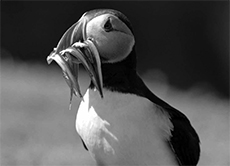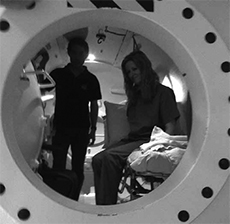




| Home | Features | Club Nights | Underwater Pics | Feedback | Non-Celebrity Diver | Events | 6 July 2025 |
| Blog | Archive | Medical FAQs | Competitions | Travel Offers | The Crew | Contact Us | MDC | LDC |

|

|
 
 |
  ISSUE 14 ARCHIVE - AT THE CHAMBERZoe DiderichIn Denial“You won’t be diving anymore then…” A month ago, the thought of it would never have crossed my mind. I imagined myself with white hair and a battered old dry suit, rolling my trolley down to the boat at the age of seventy. For the last five years, I wouldn’t be exaggerating if I said that diving has been as much a part of my life as my work and I m a very active member of a Central London club. This summer was booked up with diving trips and evenings as well as weekends of training. Although I felt quite exhausted, I was so pleased to have booked a few diving weekends with friends to places I had never been before, such as Pembrokeshire and Brixham, to dive with seals and even see some dolphins. In Pembrokeshire, the scenery was amazing, and the two-hour long journeys on the hard boat were spent gazing at oil refineries, tankers, the many islands and wildlife inhabiting them, as well as some very nice naps. On the first day, the skipper gave us a briefing, boasting that he had never broken out the oxygen for any incidents in twenty-five years of operation. We all laughed and added our sarcastic comments, until now! The dives were mostly above thirty metres and not very challenging and no ridiculous ladders to climb up it was equipped with a very nice lift. On the first day, after the first dive, I was putting my equipment away when I suddenly felt a sharp pain in my lower back. As I was very tired and the drive to Wales the previous night had been long, I was feeling a bit stiff and worn out. The pain was very intense though, and suddenly I felt pins and needles from my hips down to my toes. Strange I thought, although there had been quite a current on that dive and my buddy Sally and I had been swished as though inside a washing machine, so maybe I had twisted my back or pulled a muscle. I decided it was my kidneys and that it was probably that I needed to pass water. But when I tried to go to the loo, I couldn’t. That sometimes happens when you hold it in too long. I went back on the deck, took off my suit and decided to lie down as my hips and legs felt a bit numb; the pain disappeared. The skipper asked me if I was all right, I explained what was happening. My partner said I should be going on oxygen, just in case, but I said I felt absolutely fine. The skipper suggested it was the weight belt that had hurt my back, but I explained I had worn soft weights. He insisted it was the weights, and it was concluded that I had probably trapped a nerve. A few minutes later I got up and stamped my feet, I was fine again. I was so relieved, all I could think of was the proud skipper’s twenty-five year record, I was so glad not to have ruined that. Anyway, I decided to sit out the next dive to gaze at the puffins, and the rest of the trip went ahead without any further problems. A couple of weeks later, my partner Mark and I drove down to Brixham in Devon, for another weekend of diving and spending time with friends. We were diving off another hard boat, but this one sadly didn’t have a lift, and the ladder was particularly difficult, so much so that some of us had to take our equipment off before climbing up, as it was just too hard. We took endless hilarious videos of each other making fools of ourselves on the ladder. I like to challenge myself and feel like I am letting myself down if I can’t manage the weight of something. I never let anyone carry my bag and almost feel insulted when, in France, people offer to carry my tank to the boat. I’m not one of those girls... Even if I look like one. I never dive without my bright red waterproof lipstick. On Sunday morning, my buddy Susie and I dived the Bretagne, a very pretty wreck that lies at about twenty six metres, which has some nice swim-throughs and is covered in life. As it was the second day, the ladder didn’t seem as bad, and I felt quite excited as there was plenty to talk about after the dive. About ten minutes after surfacing, the sharp pain that I had felt before returned. I didn’t want to make a fuss, I didn’t want people to think I was seeking attention. But this time, the pain got worse and worse, spreading to my abdomen and making my legs go numb again. I told my partner and asked him to remove my suit for me. Most of the people on this trip had been present the last time this happened, so I told everyone it was that trapped nerve again. They cleared an area for me to lie down. The pain got so unbearable that I wanted to scream, I don’t think I was far off actually, I remember almost sobbing. The skipper immediately came out and asked me what had happened. Mark asked him for oxygen and he gave it to me straight away. All my friends were very helpful and it almost felt like a rescue training exercise, it was such a surreal experience. The skipper contacted the Coastguard, who decided to send out a helicopter for me. After a few minutes on oxygen, I felt completely well again, and my legs returned to normal. A helicopter? How ridiculous, that’s for people who are seriously injured! Seeing that I was fine, my friends were very excited as they were asked to clear the deck, and were getting out their cameras to film the helicopter pick-up. I didn’t want to spoil their fun, but I asked the skipper to cancel it as I felt it was a waste of resources, and I also felt like a fool. The Coastguard said they would send an ambulance. I was the worst victim. I really hate being unwell and refused to lie down any longer, I didn’t need the oxygen anymore and assured everyone I was feeling one hundred percent again, not to worry. When we arrived back at the port, the helicopter was flying around, there were flares on the harbour wall. An ambulance was waiting for me. All I could see were the tourists staring and waiting to see the injured idiot. I sheepishly walked to the ambulance, and after a quick assessment, the paramedics advised me that I should probably get checked out by a diving doctor, but that I wouldn’t need a visit to the hospital. The diving doctor at the DDRC was on the phone with my partner. She was insisting that I go to the chamber in Plymouth, and the helicopter was still waiting for me. I realised at that stage that I must be bent. It sounds really obvious, but when you feel fine you don’t know there’s something nasty looming inside of you. It’s a bit like termites, the house looks fine from outside but it’s slowly being eaten away inside, and it wasn’t a staircase that was under attack, it was my spine that was being munched on. The ambulance drove me out to a field where an RAF helicopter picked me up. It was really amazing having an ECG whilst admiring the view. When I arrived at the DDRC, I was greeted by very friendly faces, there was quite a lot of activity, three divers were in today, very unusual, “must be something in the water!” I was wheeled around everywhere and when the doctor asked me about my symptoms, she couldn’t help smiling and nodding: “Classic spinal bend!” I was so shocked. She checked out my legs, my reflexes were incredibly fast, it really looked strange. When I closed my eyes I kept falling to the right. I spent seven and a half hours in the chamber. The first few were spent watching Will Smith in “Hitch” and feeling quite nauseous, which I put down to the bad acting, but was most probably due to breathing helium and oxygen, and hearing the sound of my Darth Vader breathing which made me feel anxious. Kath, a very nice medical student who kept me company during my treatment laughed when she was temporarily narked as we reached thirty metres. The following day, I felt as though someone had beaten me up, I could hardly walk and there was a very annoying buzzing feeling in my legs. Six more hours in the chamber, this time with Ollie. We watched a Jack Nicholson movie and laughed at Diane Keaton’s matronly starched outfits. Everyone was very chirpy and none of it felt bad. On my third day in Plymouth, I shared a larger chamber with some patients from the hospital, who had a variety of ailments. This treatment was just under two hours. They were elderly and quite used to the chamber, one of them had a mini scaffold on his jaw which was bolting it together. One patient could hardly wait for the movie to start. We were all wearing scrubs and it felt like a little community, with everyone chatting and joking. The doctor recommended I continue the treatment back home, so I contacted Dr Firth at the London Diving Chamber in St John’s Wood. I was given an appointment the next day, and greeted by very friendly staff. I went back for seven sessions. There were four other divers over the course of the treatment, who each had different symptoms. Some of them spoke of their bend, while others refused to make any eye contact or say a word, preferring to hide behind their novels in the confined space of the chamber. I realised that getting bent was definitely a taboo, and that denial remains even when undergoing treatment. In my diving club, I very openly explained exactly what had happened to me. Most people were very supportive and I didn’t feel labelled in any way. If divers spoke about their bends more openly, it would help us all to understand them better, and to detect problems at an early stage. Relying on training materials is simply not enough. You need to be aware that a bend can often be explained away, as the symptoms can look like seasickness, or backache. I was told I would make a full recovery but that I would need to see a cardiologist to check whether I had a PFO. It was explained to me that this was quite a straightforward procedure, although one diver I met said he had a PFO and would never dive again, as he had seen many cases of people needing open-heart surgery following unsuccessful PFO procedures. This is where the loneliness sets in. There is actually nobody who can comfort you whilst awaiting your appointment, and nobody to tell you when you will actually be diving again. When the bouquets of flowers have wilted and everything is back to normal, you are not back to normal, because now there is so much doubt in your mind about something that had such a firm presence in your life. Maybe this stress will cause another bend... Previous article « Best Dive, Worst Dive: Sarah Bagdi Next article » Rob’s World: The Dive Community Back to Issue 14 Index |